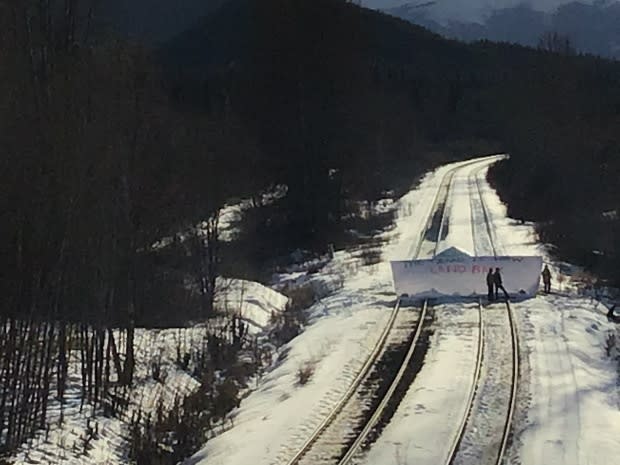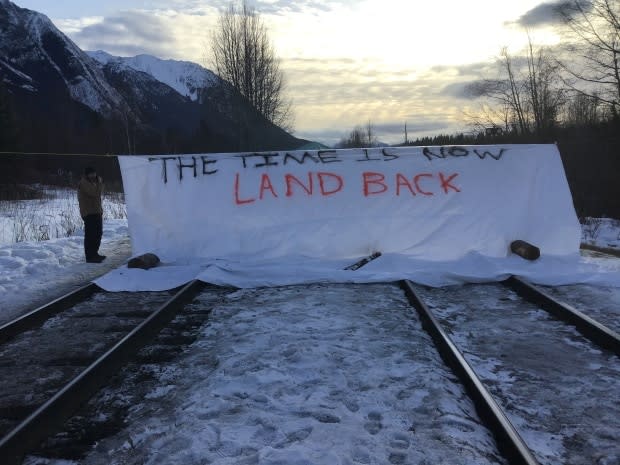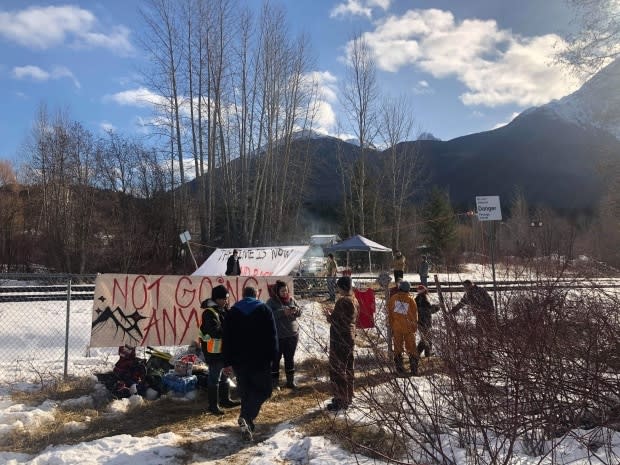Hereditary chiefs, protesters arrested at rail blockade in northern B.C., say witnesses
Several people, including at least two hereditary chiefs, were arrested at a railway blockade in northern B.C. Monday evening, according to witnesses.
Members of the Gitxsan Nation set up the blockade near New Hazelton, north of Smithers, B.C., mid-afternoon, less than two weeks after a similar blockade at that site was dismantled on the promise of dialogue from federal and provincial politicians.
Gitx'san Nation Hereditary Chief Spookw said the protesters were out in support of Wet'suwet'en hereditary chiefs who oppose the Coastal GasLink pipeline project in northern B.C. They were also opposing the arrests of demonstrators at a Tyendinaga Mohawk Territory camp next to a railway crossing in Ontario earlier Monday.
At the blockade, witnesses described a chaotic scene of arrests in the dark, involving about 40 protesters and 20 police officers. Neither RCMP or CN Rail police would confirm the arrests..

Chief Spookw, 60, was one of the people arrested, according to his wife Linda Stephens, who watched her husband being led away. "I was there and it was pretty intense," Stephens said.
"I brought his traditional blanket over to the railway track and helped him put it on. I turned around to step away ... and turned back and he was already being escorted away by police."
She said several other hereditary chiefs were also arrested, as well as other protesters.
Stephens said she didn't know how many people in total were arrested because it was too dark. And couldn't tell if the arresting officers were RCMP or CN Rail.
Wet'suwet'en chief Dinize Ste ohn tsiy, who also goes by Rob Alfred, was also at the scene. He said at least eight people were arrested. He too saw Chief Spookw being led away by police in his regalia, and the arrest of 80-year-old matriarch Gwininitxw, also known as Yvonne Lattie.
"It was chaotic," Dinize Ste ohn tsiy said over the phone, with the sound of shouts and drumming in the background.
Chief Spookw was later released.
A RCMP spokesperson wouldn't confirm the arrests, saying that area falls under the jurisdiction of CN Police.
Jonathan Abecassis, senior media relations manager with CN Rail, declined to comment.

Video footage and photos circulating on social media showed Chief Spookw being led away as some witnesses live-streamed the arrests. The photos showed RCMP vehicles at the scene.
"People are pretty upset that these hereditary chiefs are being arrested on their own territory," Stephens said.
After the arrests, protesters moved to Highway 16, which runs east-west along northern B.C.
"It's morphed into a highway blockade now," Dinize Ste ohn tsiy said. "No traffic is going through at all."

Supporters of the Wet'suwet'en hereditary chiefs who oppose the Coastal GasLink pipeline project had been blocking the CN Rail tracks and halting transport between Prince George and Prince Rupert for several days earlier this month.
That blockade was taken down on Feb. 13 after Prime Minister Justin Trudeau and Premier John Horgan agreed to set up a meeting between officials and hereditary chiefs.

On Monday, protesters returned to the site and again blocked the rail line. CBC News spoke to Spookw hours before his arrest.
"We had put things on pause so that dialogue could take place," Spookw said. "But the dialogue has stalled and is going far too slow for our liking."
Blockades and protests intensified Monday across the province as an anticipated meeting between federal leaders and Wet'suwet'en hereditary chiefs who oppose the natural gas pipeline through their territory has yet to materialize.

Hundreds gathered outside the B.C. Legislature, while others blocked a road leading to the Port of Vancouver and railway tracks of the West Coast Express, a commuter train..
Spookw, who is also known as Norman Stephens, said the latest blockade was aimed at creating a network of First Nation support across the country.
"Divided, we are weak. But when we stand together, we're strong."


